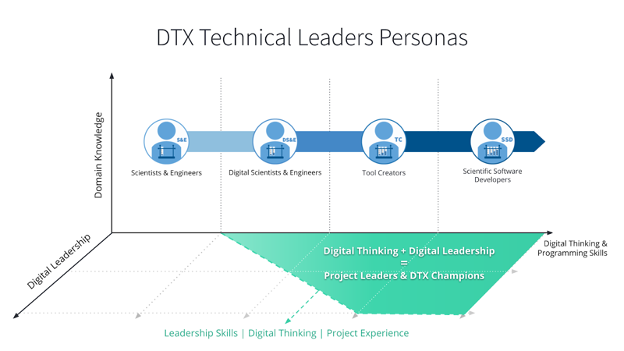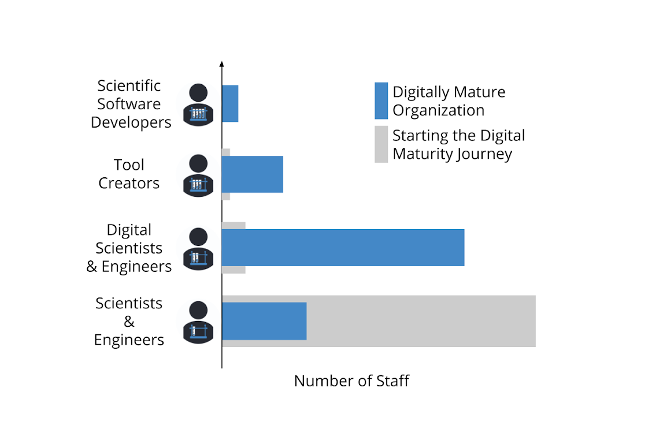Digital skills personas for success in digital transformation
The digital skills mix varies widely across companies, from those just starting to invest in digital transformation initiatives, to ones well into their journey. Building a community of people who think digitally and are able to innovate and quickly prototype ideas is key to delivering results.
Author: Alexandre Chabot-Leclerc, Ph.D., Vice President, Training Solutions
Identifying Digital Personas
Enthought defines digital transformation as a multi-year process of facilitating and accelerating an organization’s journey of increasing digital maturity, a journey that continuously delivers business results. To help guide companies in their journey, Enthought has created a framework consisting of 5 elements of digital maturity: digital strategy, digital skills, digital tools, data and data flow, and data infrastructure.
This blog post focuses on the Digital skills element. Digital skills, knowledge of scientific computing techniques and the possibilities they can create, are essential to execute on digital strategy and to leverage new technologies. To support digital skills development in digital transformation initiatives, a collection of personas has been formulated to define learning trajectories, inform team composition, support effective governance, and simplify communications.
A Personas Framework for Digital Transformation
Personas are names for different ranges of skills and competencies along three interdependent axes illustrated below: domain knowledge, digital thinking and programming skills, and digital leadership.

Development along the (scientific) domain knowledge axis accelerates during university, deepens in any graduate program, and grows further with additional specialization and science-driven work experience.
Growth along the digital thinking and programming skills axis is when a scientist becomes a “scientist who codes.” This skill can develop over multiple time horizons; from an early age, to university, to the work environment. The skill is most powerful when it has developed in parallel with scientific problem solving requiring creative thinking.
The third axis, digital leadership, is a crucial component of a digitally mature organization. Digital leaders have an acute sense of the possibilities enabled by digital skills and technologies. They manage projects where scientific software development in combination with the new generation of digital technologies is critical to success.
Creating Scientists Who Code
Consider the Scientists & Engineers of Figure 1 above, at the lowest digital skill level. They understand the data and computations they work with day-to-day, but use only commercial, specialist software, very often including Microsoft Excel. They become a Digital Scientist when they learn enough computer programming to implement solutions tailored to their problems, rather than being constrained by pre-packaged workflows in scripts or GUI apps. They’re able to create ad hoc analyses and reports that were not possible with the existing software tools. They increase their efficiency by automating tedious processes. Equipping scientists with these skills is one of the most popular programs delivered by the Enthought training organization.
These Digital Scientists can now take advantage of their new programming skills to quickly prototype and innovate, developing valuable new tools, measurements, and analyses that save time, reduce errors and risk, and enable new possibilities in their work. They learn to share their tools with coworkers, which multiplies their impact. This new persona is called a Tool Creator. Creating focused tools to solve business problems within a digital transformation is part of their responsibility. One of the most effective ways to develop this new persona is to immerse the Digital Scientist with a deep expert in scientific software development, working on one of their own problems, including AI/machine learning. This is a feature of the Enthought Technical Leaders Program.
Tool Creators develop further by learning from, and collaborating with, a community of peers doing similar work. They contribute to richer and more impactful tools. Some Tool Creators become Scientific Software Developers: expert programmers with deep scientific knowledge. They know how to engage fellow scientists to identify requirements and how to scope problems. Working with others, they enable new possibilities by developing custom solutions for their team, business unit and company.
Developing Technical Leaders
The development axes are interdependent; one needs digital thinking and at least some programming skills to understand the possibilities from the technology and develop digital leadership. At varying points, one can transition from one track to another as a part of natural career progression. Scientists and engineers can develop more leadership skills, and managers can develop more digital thinking and programming skills.
Project Leaders manage key projects where digital technologies and skills have the potential to deliver significant business results. They have domain knowledge and at least a minimum level of computational programming skills, so that they know what’s possible, even if they don’t code. This persona will have a digital thinking and programming skills at the level of Digital Engineers, Tool Creators, or Scientific Software Developers (the latter a unicorn).
Digital Transformation (DTX) Champions can identify where digital technologies can transform existing workflows and have the largest impact. They can map business value, prioritize projects according to their risk, costs, and business impact, and lead the execution of projects that take advantage of new technologies. DTX Champions are strong leaders, with deep technical knowledge and an excellent understanding of the business.
Teaching leadership is hard, especially when combined with digital capabilities. The Enthought experience from our Technical Leaders program is to create the conditions in digitally driven science projects where leadership can emerge.
The Skills Mix in a Digitally Mature Organization
Every organization has its own career ladder for their scientific community. The goal is not for every scientist and engineer to become a scientific software developer. However, companies do share a goal to raise the overall level of digital skills and leadership, as illustrated in the figure below. A higher overall digital maturity creates a community of practice for thinking digitally, which accelerates the rate of learning. Scientists and engineers are more likely to find innovative solutions to business problems, and implement them in a way that’s right for the business without being limited by third-party applications.

Creating New Possibilities
For science-based companies, the business results possible from digital transformation can only be realized if the community of domain experts core to the business have the skills required to develop solutions appropriate for their challenges. The second requirement is their leaders must know what’s possible with digital technologies, skills, and how to harness them.
For more than a decade, Enthought has been teaching scientific computing to scientists and engineers, enabling them to solve whole new classes of problems.
About the Author
Alexandre Chabot-Leclerc, Ph.D., Vice President, Training Solutions at Enthought, holds a Ph.D. in electrical engineering and a M.Sc. in acoustics engineering from the Technical University of Denmark and a B.Eng. in electrical engineering from the Université de Sherbrooke.
Related Content
Enthoughtが定義する、製薬会社の研究開発ラボにおける真のDX
Enthought GKチームは、東京で開催されたライフサイエンスカンファレンス「ファーマIT&デジタルヘルスエキスポ2022」に出展し、技術的な見識と市場成長の活性化を求めて集まる製薬業界のリーダーたちと会談しました。三日間の会期中に200社が出展し、6700人以上の参加者が集まりました。 デジタルトランスフォーメーションが主要テーマである本展示会は、当社のターゲットとする企業に、製薬業界の新薬開発を加速させる当社のサービスを
科学における大規模言語モデルの重要性
OpenAIのChatGPTやGoogleのBardなど、大規模言語モデル(LLM)は自然言語で人と対話する能力において著しい進歩を遂げました。 ユーザーが言葉で要望を入力すれば、LLMは「理解」し、適切な回答を返してくれます。
Life Sciences Labs Optimize with New Digital Technologies and Upskilling
Labs are resetting the tr…
From Data to Discovery: Exploring the Potential of Generative Models in Materials Informatics Solutions
Generative models can be used in many more areas than just language generation, with one particularly promising area: molecule generation for chemical product development.
The Importance of Large Language Models in Science Even If You Don’t Work With Language
OpenAI's ChatGPT, Google's Bard, and other similar Large Language Models (LLMs) have made dramatic strides in their ability to interact with people using natural language....
Making the Most of Small Data in Scientific R&D
For many traditional innovation-driven organizations, scientific data is generated to answer specific immediate research questions and then archived to protect IP, with little attention paid...